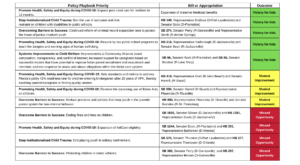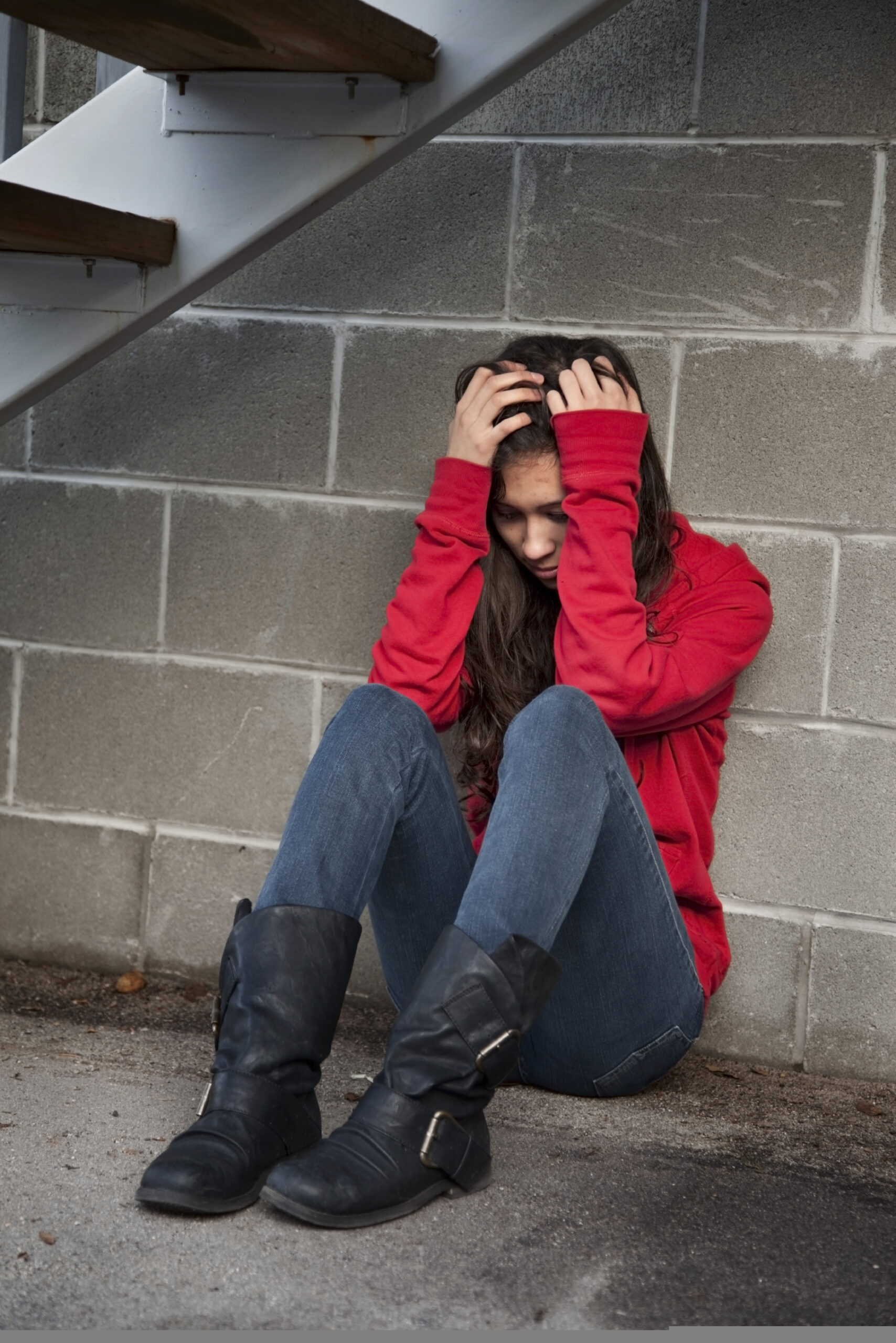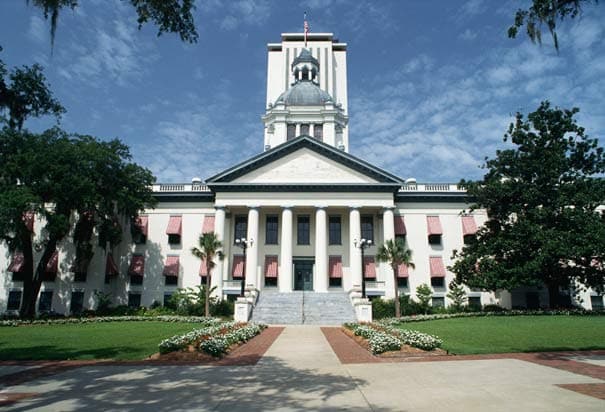Victories for Kids, Modest Improvements, and Missed Opportunities
 The 2021 Session came to a close with policymakers and Floridians looking toward the future and a new normal in a freshly vaccinated pandemic world. Our nation’s strife was reflected in session with highly partisan, first-introduced bills flying through the process with party divided votes. Policymakers passed measures impacting voter laws, social media censorship, trans children’s rights, and alcohol-to-go all while grappling with the appropriate use of the federal American Rescue Plan Act (ARPA) dollars.
The 2021 Session came to a close with policymakers and Floridians looking toward the future and a new normal in a freshly vaccinated pandemic world. Our nation’s strife was reflected in session with highly partisan, first-introduced bills flying through the process with party divided votes. Policymakers passed measures impacting voter laws, social media censorship, trans children’s rights, and alcohol-to-go all while grappling with the appropriate use of the federal American Rescue Plan Act (ARPA) dollars.
Despite the polarizing issues, some significant victories for children in our 2021 Policy Playbook/ Legislative Agenda were achieved. There were also modest changes for kids that didn’t go far enough to provide the impact that they could have, as well as missed opportunities to bring the state’s policy for children in line with best practices.
This year’s appropriations process was similar. Bolstered by APRA funds that were released to support those hardest hit by the COVID-19 pandemic, there were wins for children in areas like maternal health, which allocated $240 million to expand postnatal care for mothers to 12 months. Unfortunately, there were also misses. Investments in human trafficking programs decreased by 4% even though reports increased by 35% since the pandemic began. And Community-Based Care saw their duties increase due to good policy changes without accompanying funding to implement the new requirements. Child care retained current funding levels with some eligible for a 15% bounce if meeting certain standards. Juvenile justice funding, overall, decreased.
American Children’s Campaign 2021 Legislative Scorecard
Highlighted below are more details regarding the changes American Children’s Campaign called for in our 2021 Policy Playbook and how they were addressed this session.

Victories for Kids
Seclusion and Restraint: After nine years of introduction and never quite making it to the finish line, in 2021 policy makers passed HB 149 which will ban the use of seclusion and limit restraint on children with disabilities in public schools. The bill also requires the use of Positive Behavior Intervention Strategies (PBIS), training for school safety officers and others who work with students with disabilities and increases the transparency of data related to instances of restraint. In the 2017-18 school year, there were 8,367 documented incidents of restraints and 834 cases of seclusion. This bill, if signed by the Governor, will keep public school children safe from these mentally and physically harmful practices and keep instances of restraint to only when needed. Special thanks to Representative DuBose (D-Fort Lauderdale) and Senator Book (D-Plantation) for championing this important legislation through the process.
 Record Expunction: Continuing the work that advocates including American Children’s Campaign started over five years ago, Senator Perry (R-Gainesville) and Representative Smith (R-Winter Springs) successfully continued the reform of criminal record expunction laws to protect the future of justice-involved youth by expanding juvenile diversion expungement. SB 274 allows any juvenile who completes a juvenile diversion program regardless of charge to follow a process to expunge their record. This opens doors to educational, employment, housing, and military opportunities that could have been closed.
Record Expunction: Continuing the work that advocates including American Children’s Campaign started over five years ago, Senator Perry (R-Gainesville) and Representative Smith (R-Winter Springs) successfully continued the reform of criminal record expunction laws to protect the future of justice-involved youth by expanding juvenile diversion expungement. SB 274 allows any juvenile who completes a juvenile diversion program regardless of charge to follow a process to expunge their record. This opens doors to educational, employment, housing, and military opportunities that could have been closed.
Human Trafficking Education: Schools will keep older students safer by providing information on human trafficking, avoiding victimization. HB 519, requires by law public school programs to teach the dangers and warning signs of human trafficking, exploitation, and prevention of child sexual abuse in health education. These requirements that were already in the curriculum by an administrative rule are now embedded into law and more visible to the public.
Child Welfare Improvements: Responding to intense national criticism of Florida’s child welfare system, more than 40 bills were introduced proposing changes to the way the state interacts with abused, neglected, and abandoned children. Two of them, SB 96 and SB 80, made it through the process and are on their way to the Governor for his signature.
These bills make changes in administration, abuse reporting, child protective investigations, out of home placement and changes in placement, stakeholder input, educational transitions, sibling placement, caregiver support, termination of parental rights, and aging out of foster care. Administration of Child Advocacy Centers and Community-Based Care organizations were addressed, including Child Welfare Alliance board composition, transparency, and conflict of interest.
Highlights include: changing placement priority which places family by blood at the top of the list – including non-offending parents, relatives and siblings, the requirement that Family-finding programs and Kinship navigator programs are active in every Community Based Care agency, and Multidisciplinary teams to help decide the best path for children in the care of the state.
Currently Family-finding is only available in 5 of 19 CBCs and none of them have a Kinship Navigator Program. Increased support for caregivers is based on models of foster parent support that were successful locally and have the potential to improve recruitment and retention of foster parents.
Policy makers addressed investigation and response to abuse and abuse allegations within the foster care system by adding child sexual abuse in out of home care to those cases that require a Critical Incident Rapid Response.
These changes have the potential to improve the well-being of Florida’s abused and neglected children, but it will be important to watch closely to ensure that they work in practice. They will also require investment to reach best practice status. Did the CBCs fight over executive compensation this session allow them to win the battle and lose the war over funding levels for child welfare?
Modest Improvements

Early Learning: The Legislature made changes to address Florida’s kindergarten readiness rate of 42%. HB 419 focused much of the change on administration, revising the statewide governance of early learning programs and establishing a Division of Early Learning within the Department of Education and a Council for Early Grade Success. Representative Grall’s (R-Vero Beach) and Senator Harrell’s (R-Stuart) legislation establishes a new Voluntary Pre-Kindergarten (VPK) accountability system based on a performance metric that includes student outcomes, learning gains, and child-teacher interactions and allows districts to use the research-based reading allocation to fund intensive interventions for VPK students who are identified with a substantial reading deficiency.
The bill did not address components that are proven to increase quality in early learning programs but are not included in Florida’s VPK program including; requiring a bachelor’s degree and experience for lead teachers, a CDA or equivalent for assistant teachers, expanding the number of hours per day pre-k is offered, or allocate additional dollars for quality. This bill will do well identifying VPK programs that are struggling but will it increase the quality of education provided to Florida’s youngest learners? Time will tell.
Reduce Baker Acts of Minors: After a more than 83% increase in the rate of involuntary examination of minors in only 10 years the state required a review of the rising numbers and policymakers began to look at ways to reverse the escalating use of Florida’s Baker Act on children. SB 590 requires a reasonable attempt to notify a student’s emergency contact of their involuntary examination by a principal, the inclusion of school-initiated Baker Acts in reporting requirements, the creation of policies that include de-escalation in connection with a mental health professional prior to involuntary examination and revising training requirements for school safety officers.
Sponsored by Senator Harrell (R-Stuart) and Representative Plasencia (R-Titusville), the bill is currently awaiting the governor’s signature and moves in the direction of data collection and parent involvement but won’t prevent trauma associated with a child being taken by law enforcement to a receiving center for involuntary examination. This change also won’t curb the increasing Baker Act rates because it does not tackle the impossible choice of schools between safety and helping individual students in crisis without adequate resources to provide mental health support that could keep issues from rising to crisis levels.
Human Trafficking: Best practices show human trafficking victims have better outcomes when they have support from advocates and other survivors. SB 1826 creates privilege between advocates and victims which allows them safe space to talk about their experience and start to heal. The bill also provides victims with the ability to move on with their life by removing barriers to expunction including fees and the number of offenses that one can have expunged for charges gained while being a victim of human trafficking. The bill sponsored by Senator Diaz (R-Hialeah Gardens) and Representative Toledo (R-Tampa) also increases the criminalization of traffickers by including intent to traffic a child under 18 regardless of the age of the victim to the list of human trafficking offenses, as well as the requirement that traffickers are added to the sex offender registry. Unfortunately, the bill does not remove the list of charges that cannot be expunged even though the victim was being trafficked at the time or provide support for trafficking victims in court – which would make the process easier for victims to help ensure their trafficker faces the appropriate punishments.
Technical violations of juvenile probation: To help youth successfully move forward from childhood mistakes it’s important to reduce practices and policies that keep youth in the juvenile justice system for non-criminal behavior, including technical violations of probation. HB 885, along with provisions that address fiscally constrained counties and cost sharing, includes language requiring that consideration be taken of certain information if a child fails to appear in court prior to issuing an order to take the child into custody as well as requires judges, the state attorney, the public defender, the regional counsel, and relevant law enforcement agencies in each judicial circuit to work together in developing a written plan specifying the alternative consequence components available when a juvenile commits a technical violation of his or her probation.
Missed Opportunities

Ending fines and fees on children: Unfortunately, two common-sense criminal justice reform bills, SB 1926 by Senator Gibson (D-Jacksonville) and HB 1391 by Representative Davis (D-Jacksonville), never got calendared. Unpaid fines and fees on children cause profound harm to kids’ ability to further their education, maintain jobs and avoid homelessness. Florida professionals report children who are unable to pay their fines and fees receive extended probation and placement, can’t expunge their records, face civil judgment, have their drivers’ licenses suspended, and even can’t be adopted out of foster care. Florida’s crossover children and black and brown children are disproportionately impacted.
Expansion of Kidcare Eligibility: SB 1244 by Senator Book (D-Plantation) and HB 201 by Representative Bartleman (D-Weston) both never had a hearing in their first committee. These bills that would have increased the income eligibility threshold for the full pay Medikids and Florida Kidcare programs from 200% of federal poverty line (FPL) to 300% or less than $66,000 a year for a family of three. The increase of KidCare eligibility limits would eliminate the gap between children who don’t currently qualify but whose parents can’t afford health insurance. In 2019 Florida was ranked 8th highest in the nation for children without health insurance. According to the Kaiser Family Foundation, over 73% of those uninsured had one or more full time workers in the family and almost 34% had a family income at 200-399% of the FPL.
Youth in Solitary Confinement: SB 570 by Senator Thurston, Jr. (D-Fort Lauderdale) and HB 377 by Representative Thompson (D-Orlando) could have ended the practice of placing youth in solitary confinement. These bills would have prohibited the Department of Corrections from placing youth who are younger than 18 in solitary confinement. The Florida Department of Juvenile Justice placed 4,310 youth in solitary confinement in 2017-18. For children, who are still developing and vulnerable to irreparable harm, the risks associated with solitary confinement including psychological, physical, and developmental harm are magnified – particularly for kids with disabilities or histories of trauma and abuse. Unfortunately, both bills were not heard during the 2021 legislative session, dying in their first committee.
Booster Seats: The opportunity to enact research-based solutions to protect young children in motor vehicles in private or public transportation was missed yet again by the Florida legislature this year. SB 380 and HB 297 would have increased the age requirement for use of child restraints in a motor vehicle from age 5 to 6 for children. Motor vehicle crashes are the leading cause of death for children in the United States, and the second cause of death for Florida children. According to the Centers for Disease Control and Prevention, booster seat use reduces the risk of serious injury by 45% in children 4-8 years compared to seat belt use alone. States that have increased the age requirement for booster seats to age 7 or 8 have seen the use of booster seats go up while children who suffer fatal or serious injuries went down significantly.
If you like reading our publications, we need your help to keep them coming. The Children’s Campaign is privately supported to maintain our independent voice. Please consider making a tax-deductible donation today!
This Capitol Report is brought to you by Amanda Ostrander, Karen Bonsignori and Roy Miller



